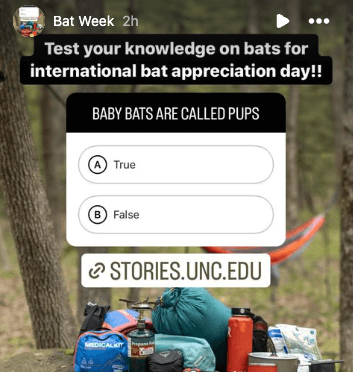
BatPack contents unpacked! BatPacks contain bat-tracking gear (shown on tree) and everything one might need for overnight hiking trips along the Appalachian Trail. (Photo by Jen Hughey)
Bats play an important role in North Carolina’s ecosystems, but since the fungus Pseudogymnoascus destructans was brought over from Europe in 2011, some areas of North Carolina have lost 98% of their bat populations. A number of native bat species in the state have either been added to the federal endangered species list or are currently under review for addition to the list.
A UNC-Chapel Hill program is working to address the problem. Led by a team at the UNC Institute for the Environment Highlands Field Site, the BatPack program takes a citizen science approach to studying bats along the southern portion of the Appalachian Trail, with the goal of informing future conservation efforts.
BatPack hikers camping along the trail use ultrasonic recorders that can pick up nearby bat activity. Once the hikers have set up their campsite for the night, they post the recorders at different locations in the area, trying to select a variety of environments such as at the forest’s edge, deep in the forest, in lowlands and among different types of trees.
Recorders capture how many bats and which bat species are in the area. They also collect information about the activity and behavior of each species of bat. For instance, recordings can distinguish whether bats are merely flying over a certain area or are using it as a feeding ground.

Rada Petric, director of the UNC Highlands Field Site, unpacks a BatPack at a campsite. (Photo by Jen Hughey)
“We’re losing millions of bats each year to various environmental threats and human activities,” said Rada Petric, director of the UNC Institute for the Environment Highlands Field Site and BatPack program lead. “But as we get a clearer picture of bat activity in the region we can more effectively prioritize areas for their conservation.”
The team is organizing a number of group camping trips and anyone who is interested in joining can learn more on the BatPack Instagram page. Individual hikers who would like to participate in the research can also request a backpack via the BatPack Instagram page and then return it to the team after their camping trip.
The team is currently raising funds to purchase all necessary camping gear for the BatPack backpacks so that anyone who wants to participate in the project can do so, even if they don’t own camping gear.
“Backpacking and hiking are expensive outdoor activities because they require the use of specialized gear,” said Petric. “By providing the necessary gear, this project will alleviate part of the financial burden to the participant, be more inclusive, increase access for all interested citizen scientists and allow us to collect more valuable data for bat conservation.”
If you’re interested in supporting these efforts, you can make a one-time gift or a recurring gift to the BatPack program.
Written by Audrey Smith ’10
Related Stories






